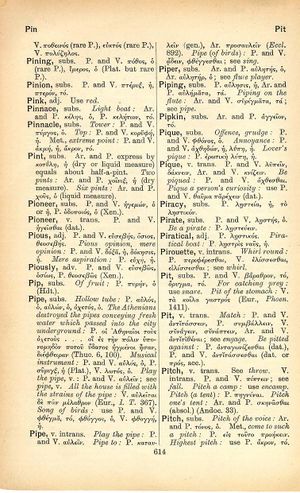piper
ὁκόταν οὖν ταῦτα πληρωθέωσιν, ἐμωρώθη ἡ καρδίη· εἶτα ἐκ τῆς μωρώσιος νάρκη· εἶτ' ἐκ τῆς νάρκης παράνοια ἔλαβεν → now when these parts are filled, the heart becomes stupefied, then from the stupefaction numb, and finally from the numbness these women become deranged
English > Greek (Woodhouse)
subs.
Ar. and P. αὐλητής, ὁ, Ar. αὐλητήρ, ὁ; see flute player.
Latin > English (Lewis & Short)
pĭper: pĭpĕris, n., = πέπερι> (Sanscr. pippali or pippalī, the same),
I pepper.
I Lit., Plin. 12, 7, 14, § 26 sq.; Cels. 2, 27: et piper et quicquid chartis amicitur ineptis, Hor. Ep. 2, 1, 270; Ov. A. A. 2, 417; Juv. 14, 293: rugosum piper, Pers. 5, 55: sacrum piper, a term intimating that the miser is as sparing of it as if it were something sacred, id. 6, 21.—
II Trop., of sharp, biting speech: piper, non homo, Petr. 44; Hier. Ep. 31, n. 2.

